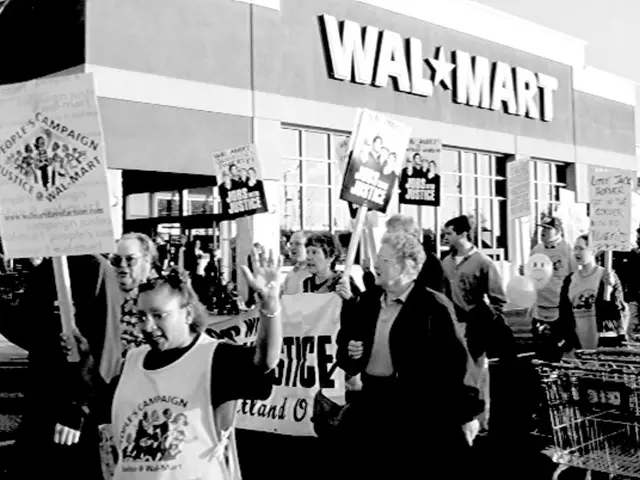Increased food supplies required in Gaza due to looting disrupting distributions
Israel's relaxation of the 11-week-long blockade on Gaza has resulted in a increased passage of aid, but challenges persist in ensuring safe and rapid distribution.
According to Hamas officials, at least six Palestinian aid workers were killed on Friday during Israeli airstrikes, as they were guarding truckloads of supplies against looters. The UN Secretary-General, Antonio Guterres, warned that only a "teaspoon" of aid has reached the conflict-stricken region, with at least 500-600 trucks of aid required daily.
In total, 107 trucks carrying flour, foodstuffs, and medical supplies entered Gaza through the Kerem Shalom crossing point on Thursday, making it 305 trucks since the blockade was eased on Monday. However, the distribution of these supplies has been hampered due to looting incidents near Khan Younis, where groups of armed men have targeted trucks carrying aid.
The UN World Food Programme stated that 15 trucks carrying flour intended for WFP-supported bakeries had been looted, highlighting the critical conditions facing Gazans. U.N. officials also expressed concern over the rising insecurity and deteriorating conditions in Gaza, especially since most of the region's 2 million residents now live in a narrowing coastal and Khan Younis area due to Israel's military operation.
Under increasing international pressure, Israel announced it will soon implement a new distribution system for aid in Gaza, sponsored by the United States and run by private contractors. However, many details regarding the system's operation remain unclear. The UN has expressed reservations about working with this new system, worried that aid distribution could be contingent on Israel's political and military aims.
Despite the intensified ground and air operation launched by Israel, the Israeli military conducted more strikes overnight, striking 75 targets, including weapons storage facilities and rocket launchers. Israel maintains that its forces will provide security for the new distribution centers and will not distribute aid themselves.
References: [1]Operational challenges can complicate the timely and safe distribution of aid within Gaza, including logistical hurdles, protection and dignity concerns, security and coordination needs, and information and transparency issues. Ensuring accountability and confidential reporting mechanisms, such as the SAWA hotline, are crucial to preserving dignity while safeguarding vulnerable populations from manipulation or abuse. Coordination and communication among multiple actors is essential in managing and distributing aid effectively. Humanitarian actors rely on up-to-date information tools like the Humanitarian Service Directory to maintain accurate data in a volatile environment, promoting accountability and supporting affected populations.
- Despite the relaxation of the blockade, challenges in education-and-self-development and personal-growth persist in Gaza due to increased insecurity and looting incidents, which have resulted in the loss of aid supplies needed for daily life.
- The general-news from Gaza has been dominated by reports of war-and-conflicts, crime-and-justice, and accidents, such as car-accidents and fires, which have caused further hardship for the region's residents.
- Amidst the ongoing political tension and military operations, the distribution of aid is becoming increasingly politicized, with international pressure on Israel to establish a new system for aid distribution, sponsored by the United States and run by private contractors.
- As the region continues to grapple with economic hardships and security concerns, the importance of efficient coordination and communication among humanitarian actors cannot be overstated, in order to ensure that aid reaches the most vulnerable populations and contribute to their overall welfare and development.








